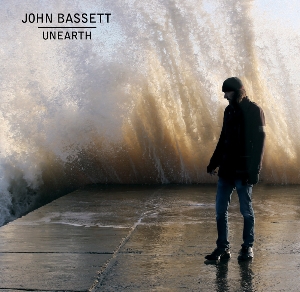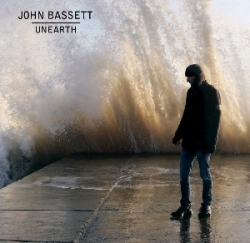English singer/songwriter John Bassett has quickly become a household name in the progressive rock world. As the mastermind behind critically-acclaimed psychedelic troupe KingBathmat, he’s paved a fairly unique path in a genre that’s all too often saturated by virtuosic emulation (and little else). In fact, the group’s last two records, Truth Button and Overcoming the Monster, provide some of the freshest and most enjoying prog I’ve heard in quite a while. However, Bassett’s latest release, Unearth, is a concrete change in direction—a solo album comprised of charming, warm, and catchy acoustic guitar ballads and protests. It’s a bold move for sure, but it definitely pays off, as its stripped-down approach likely makes it the most personal and accessible entry in his impressive discography.
Contrary to the backgrounds of many of his peers and influences, Bassett didn’t grow up in a musical environment. Raised in a modest household, he struggled to find a suitable place in the world as a student and employee, so he turned to the guitar as a way of “escaping the drudgery of everyday life” (as he writes on his website). In an interview with Rock Society Magazine, Bassett revealed how he began his most beloved project all by himself; it was only after the third KingBathmat album, Fantastic Freak Show Carnival, that he put together a proper band, having received so many requests for live appearances by that point. As for Unearth, it appeases the expectations of fans while also showcasing a significantly different side to Bassett’s artistry. It’s a humble yet confident affair throughout.
“Stay Away from the Dark” opens the disc with a soft yet serious statement about pretention, greed, and unfulfilled expectations. Bassett sings mournfully, with a melody that’s instantly gripping and affective, as well as harmonies that add to the vibe without feeling too flashy. Musically, its straightforward chord progression is complemented by graceful piano and percussion. Halfway through, he implements a tasteful, echoed arpeggio sequence that’s a bit reminiscent of Steve Hackett’s work with classic Genesis. It’s a fine way to start.
There’s a definite Floydian approach to “Survival Rate,” with a dominant dreamy atmosphere thanks to starry keys and laidback rhythms. Bassett breaks down his chorus syllabically, making it feel more dramatic (despite the relatively peaceful quality of the piece as a whole). Interestingly, “Unearth” is centered on a foreboding riff that wouldn’t be out of place on an older Opeth release. Its sparseness aids in making his words feel more profound and finite. There’s plenty of poetic social commentary within the walls of Unearth, and this track contains some of the most biting examples.
“Pantomime” and “Kylerhea” are more intricate concepts all around, with vocals, arpeggios, and subdued solos interacting beautifully. The latter one is especially luminous, but they both offer sundry journeys packed with intriguing counterpoints and timbres. “Something that’s More Worthwhile” is arguably the most ambitious selection here, as its duration allows the arrangement to grow from another acoustic trajectory to a lovely psychedelic jam with interesting loops and juxtapositions. Finally, “Comedian” is a brief yet substantial way to end the album, as its forlorn lull comforts listeners with ease. Its relatively restrained construction makes it less impressive than some of its predecessors, but it fits the tone of the songwriting very well nonetheless.
Unearth is a masterfully crafted record, and it should propel Bassett even further into the consciousness not just of genre devotees, but of anyone who enjoys heartfelt songwriting, modest production, and endearing melodies. There isn’t a single aspect here that’s out of place, and although he’s clearly capable of more grandiose productions, the songs on Unearth are neither underdeveloped nor overly elaborate. It’s obvious that Bassett took his time nurturing this LP, and I for one can’t wait to hear where he takes listeners next.


